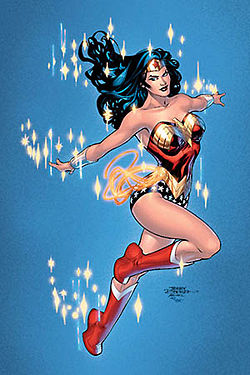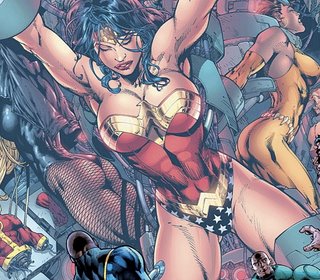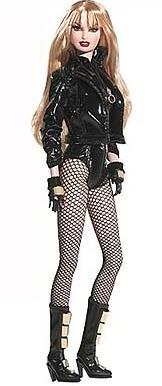Wonder Woman then:

Via Pen-Elayne here’s comics editor and blogger Occasional Superheroine on why some modern comics should be classified as erotica, not comics.
T&A Superheroines pose in every panel in a manner than accentuates their chest or ass. They often are depicted on covers half-naked. T&A Superheroines are ostensibly “empowered” females, tough wimmens…but written mostly for the males in the audience.
[…]
But that genre needs to be recognized and called what it is — fantasy/soft-core erotica. It’s not about mainstream superheroines. It’s not for children. It’s not the norm. It’s specialized.
Exactly. It’s the same reason why I stopped reading comics aged about 14. I just got too irritated as female characters were reduced to identikit hair, breasts, buttocks and pudendae. Similarly I’ve never really developed a taste for manga (it’s the creepy eyes) or most genres of anime. I’ve tried but the the fetish for big breasted yet childlike women drives me away.
As if superheroines like Supergirl, Catwoman weren’t hypersexualised enough already, along comes the porn makeover.
Wonder Woman now:

But hey, each to their own. I just wish some comics fans would stop trying to dignify what’s a pefectly legitimate sub-genre in it’s own right, graphic art/erotica/adventure/porn (choose your own description), with canonical status and then expecting women who do like comics to accept that kind of objectification as literature.
Of course graphic novels and comics can be and are literature, but I do agree with OS and i’d take it further: that the portrayal of superheroines has gone a long way down the road towards violent porn and away from any resemblance at all to actual women, while still claiming to be all about empowering the chicks.
Some might call it empowerment: I call it wank material.
That’s fine. Wank away if the spirit moves you, who am I to crriticise? But if the industry admitted that that is what it is they’d lose a big chunk of their ‘respectable’ market.
I don’t suppose a lot of parents look twice at their kids’ comic collections, but if they did I suspect they’d be shocked and want it banned. ‘Twas ever thus; here’s a portion of the 1954 Comics Code:
- Profanity, obscenity, smut, vulgarity, or words or symbols which have acquired undesirable meanings are forbidden.
- Nudity in any form is prohibited, as is indecent or undue exposure.Suggestive and salacious illustration or suggestive posture is unacceptable.,/li>
- Females shall be drawn realistically without exaggeration of any physical qualities.
- Illicit sex relations are neither to be hinted at nor portrayed. Violent love scenes as well as sexual abnormalities are unacceptable.,/li>
- Seduction and rape shall never be shown or suggested.
- Sex perversion or any inference to same is strictly forbidden.
- Nudity with meretricious purpose and salacious postures shall not be permitted in the advertising of any product; clothed figures shall never be presented in such a way as to be offensive or contrary to good taste or morals.
I’d hate to be the killjoy who shut off teenage access to graphic adventure porn, better graphic than real if you ask me, no-one gets hurt. And I’m not suggesting a heavy-handed new Comics Code Censorship isn’t the way to go.
I suppose one way around the problem would be for comic illustrators and auithors to willingly model their female characters less on ‘roided-up S&M porn stars and more on actual women, albeit with amazing superpowers. I’m not holding my breath: women aren’t the market these comics are now aiming for. I just wish they’d admit it.




